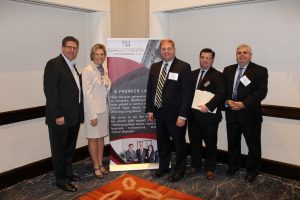 By Carrie Mason-Draffen
By Carrie Mason-Draffen
carrie.mason-draffen@newsday.com
Executives seeking information on how to avoid labor law violations shouldn’t fear reaching out to regulators for answers, even if they are uncertain their workplace practices are legal.
“Asking a question will never lead to an audit,” Irv Miljoner, who heads the Long Island office of the U.S. Department of Labor, told executives at a seminar Tuesday at the Hilton Long Island in Melville. “Our purpose is to help you come into compliance and stay there.”
But labor law violations are on the rise, largely because of companies’ failure to pay overtime, Miljoner told the gathering, which was hosted by the Ronkonkoma law firm Campolo, Middleton & McCormick (and sponsored by Citrin Cooperman and Compass Workforce Solutions). The number of cases the office closed out in the fiscal year ended Sept. 30 rose to 460, from 380 the year before, Miljoner said.
The underpaid workers are often undocumented immigrants, he said. And while employers “have an obligation” to hire workers who can legally work in this country, labor laws protect undocumented workers.
“There have been Supreme Court decisions that firmly establish that the wage and hour laws still apply to undocumented workers,” Miljoner said.
He was one of four panelists at the breakfast seminar, which addressed several workplace issues.
The use of social media on the job can be tricky unless employers have a written policy spelling out their guidelines, said Christine Ippolito, principal at Compass Workforce Solutions, a Deer Park human-resource-services firm for small businesses.
“You need to lay out for people what are the expectations,” she said.
Ippolito mentioned that a friend who works for a large chemical company complained about some employees’ frequent cellphone use in the workplace, including forklift drivers who text while at the wheel.
“The good news is that it is your network, and it is your internet,” she said of employers. “And because it belongs to you, you can restrict the access to it and what it is used for and when it is used for personal purposes.”
Employers can avoid many legal problems if they have policies about equal opportunity as well as complaint procedures that encourage employees to try to resolve concerns, such as a colleague’s untoward behavior, within the office.
“If they are willing to come to you, 99 percent of the time you will figure it out and stop it,” Ippolito said.
The panel also talked about how millennials have changed some workplace customs, such as views on tattoos.
“To be competitive and remain competitive . . . organizations have had to relax some of their standards regarding tattoos,” said panel moderator Joe Campolo, the law firm’s managing partner.
Ippolito said the presence of so many tattooed employees in the hospitality industry used to bother some of her restaurant clients until they realized some were a customer draw.
“For bartenders it was actually good for business,” she said. “For their customers it was something to talk about.”
And she added, “I always look at the work environment as, ‘Manage people based on their performance. And if it’s not interfering with their performance, so what?’”
Campolo moderated a panel that included Miljoner, Ippolito, Arthur Yermash, Esq. of Campolo, Middleton & McCormick and Thomas Walsh of Citrin Cooperman.
Read it on Newsday.
